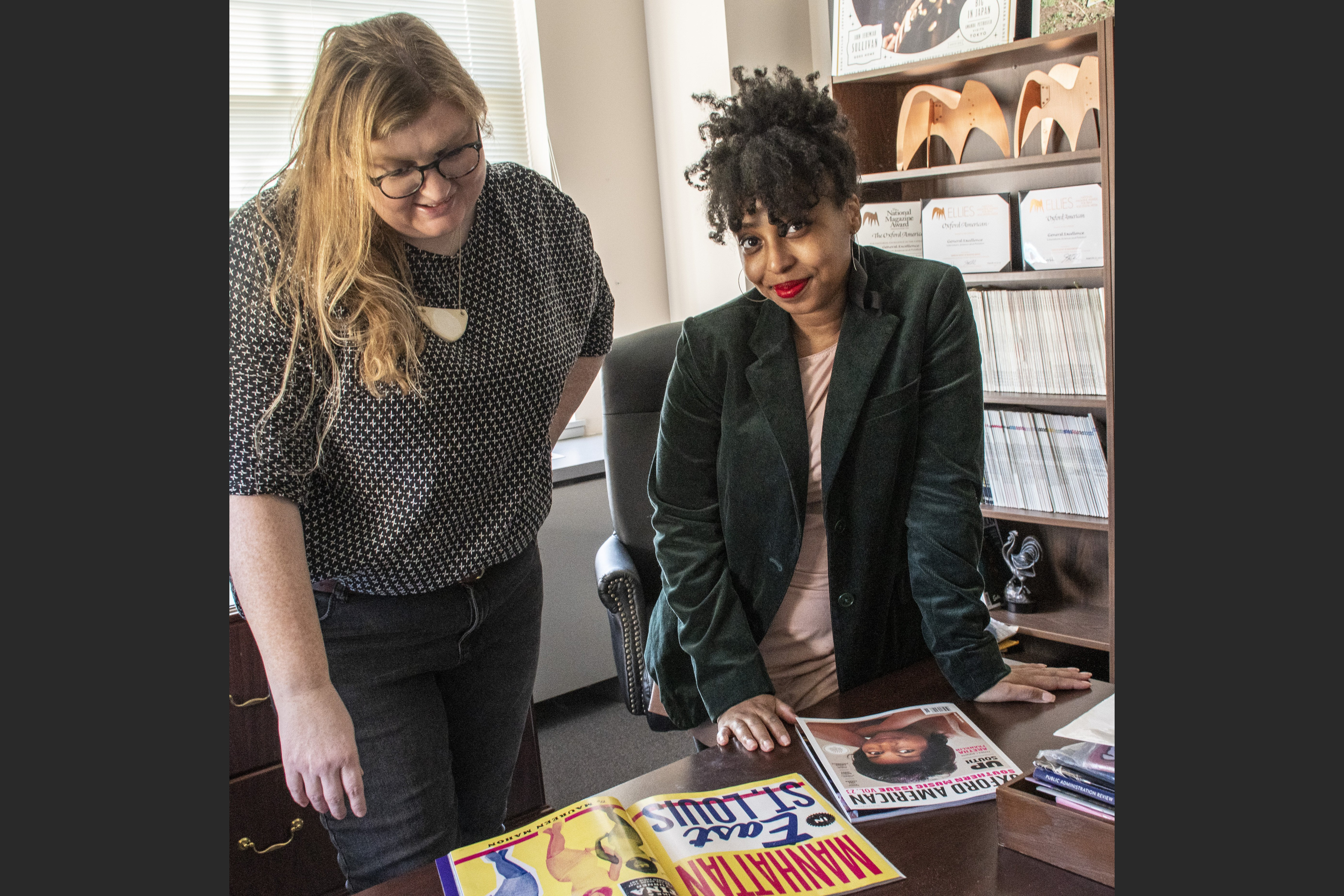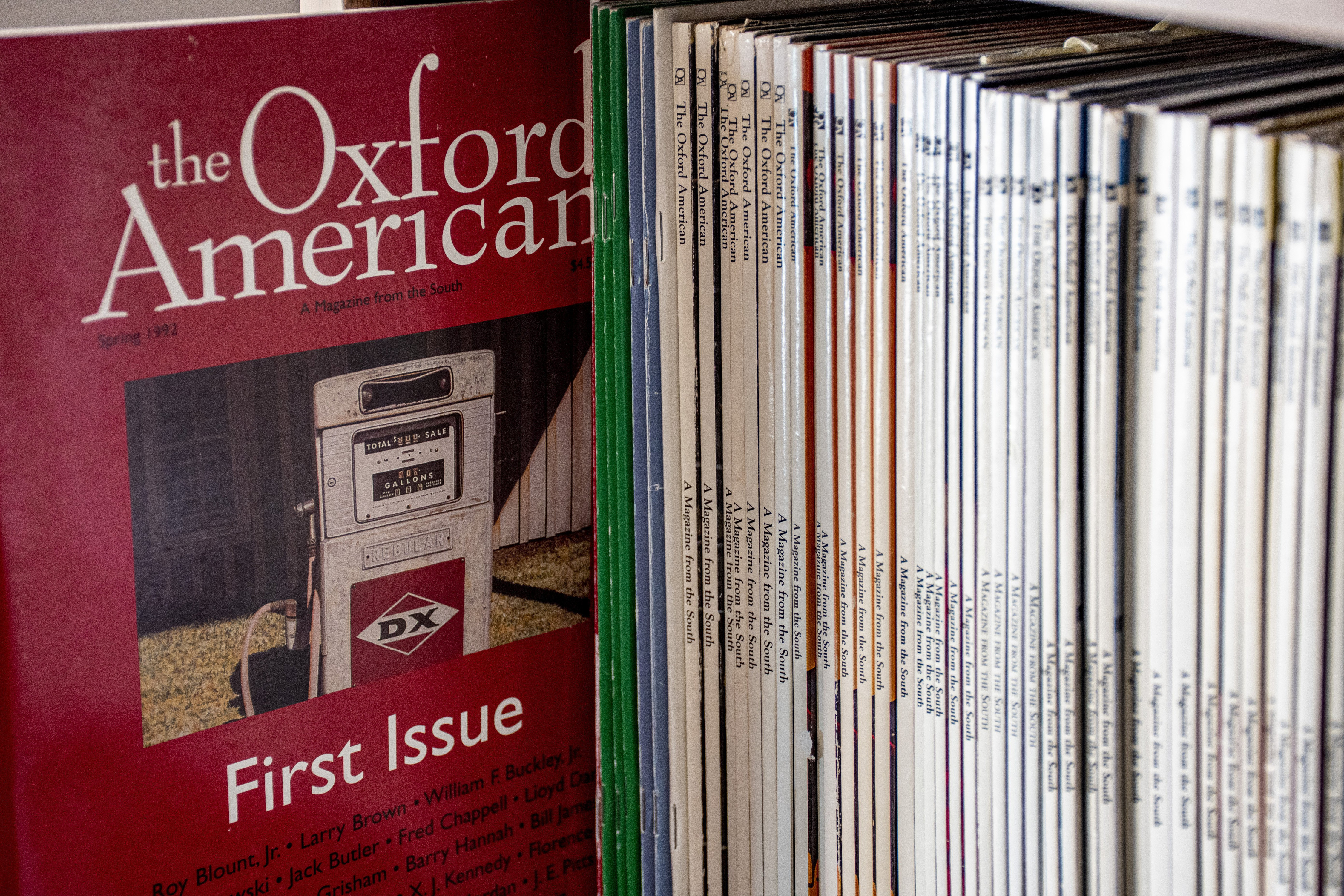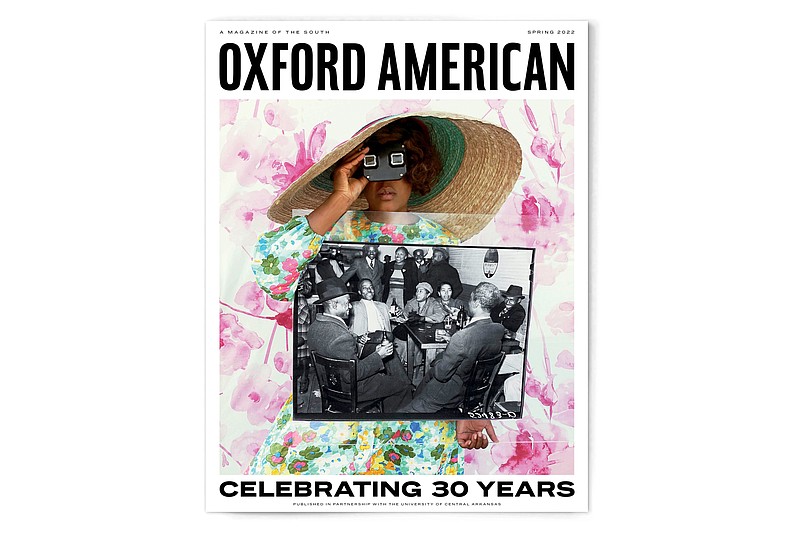CONWAY — It has been 30 years since the Oxford American first showed up on newsstands, bringing its distinctly Southern accent to the American literary magazine landscape. This month, with its Spring issue, the plucky, Conway-based nonprofit begins a yearlong commemoration of three decades of sending into the world voices and stories from the South in all their strange, radiant, complicated glory.
During its sometimes troubled run, the magazine's pages have featured short fiction, essays, poetry and journalism by William Faulkner, Jesmyn Ward, Barry Hannah, Nikki Giovanni, Lauren Groff, Larry Brown, Donna Tartt, John Grisham, Kiese Laymon and more. It publishes quarterly in the spring, summer, fall and winter and, in November, publishes its popular music issue.
In her Editor's Letter from the 128-page spring issue, "We Are Ever New," Danielle A. Jackson writes about the OA's plans to celebrate its birthday: "For our thirtieth anniversary, we won't make a monument to our past. But we will spend the year honoring the storytelling tradition we have come to exemplify — by leaning into the work."
As is the case with the best editions of the magazine, the current issue is filled with discoveries for the curious reader. It is an eclectic and obsessively gathered and edited collection of writing, artwork and photography that all seem somehow of a piece and is an invitation to experience a place and its people only those of limited imagination think they really know.
Between the covers of the new issue are short stories by Kristen Arnett and Charles Ramsay McCrory; Lauren Stroh's "Louisiana Girls: What's a happy ending for Britney Spears?"; poems by Didi Jackson and Major Jackson; Veronica Davila Ellis' piece on reggaeton singer Ivy Queen; "Making Paradise," Austyn Gaffney's profile of artist Molly Z.G.; visual art by Anna Jensen, Olivier Souffrant, William Greiner and Allison Braden; and lots more.
Amanda Petrusich is a staff writer at the New Yorker and a contributing editor to the OA, where she has written about blues fans in Japan, singer Betty Davis and Cajun accordionist Amede Ardoin, among other subjects.
"The Oxford American is really special in that what they want from you at the end of the day is really just a beautiful piece of writing," she says from her home in Garrison, N.Y. "There is less concern about following these rules or checking certain boxes. It encourages writers to experiment, to take a big swing and do something bold and ambitious."
 Oxford American Executive Director Sara A. Lewis (left) and Editor Danielle A. Jackson look over the 2021 Southern Music Issue in Jackson’s office at the University of Central Arkansas in Conway. (Arkansas Democrat-Gazette/Cary Jenkins)
Oxford American Executive Director Sara A. Lewis (left) and Editor Danielle A. Jackson look over the 2021 Southern Music Issue in Jackson’s office at the University of Central Arkansas in Conway. (Arkansas Democrat-Gazette/Cary Jenkins)
THE WOMEN AT THE HELM
On a sunny morning in late January, Jackson and Executive Director Sara A. Lewis are in Jackson's office at the magazine's headquarters at the University of Central Arkansas in Conway. The magazine moved here from its former space on Main Street in Little Rock in January 2021.
The 41-year-old Jackson, a Memphis native and former executive editor at Longreads.com, has written for the New York Times Book Review, Vulture, the Criterion Collection and other outlets. She joined the OA staff in February 2020 and was named interim editor in March 2021, after Eliza Borne, who had been editor since 2015, stepped down to work as director of development for the Central Arkansas Library System. Jackson took over as editor in May 2021. Lewis, 36, became executive director in March 2021 after leading the publication's digital initiatives for three years. She replaced Ryan Harris, who is now the magazine's finance director. She grew up outside Houston in Deer Park, Texas, and is host and co-producer of the OA's podcast, "Points South." Her 2018 OA essay, "Safe Houses," was a finalist for the Pushcart Prize, and she teaches an OA-focused publishing practicum at UCA.
Both women represent firsts at the magazine. Jackson is the first Black woman to edit the OA, Lewis is the first woman and first gay person to be its executive director.
"It means a lot, and it means nothing," Jackson says. "We're just another group of people who are interested in the arts and literature and the legacy of the OA and its audience. We geek out over reading and we want to share that with people.
"At the same time, we are part of groups who have been historically marginalized and continue to be marginalized in the South. I feel an incredible responsibility to use whatever goodwill we have earned to speak the truth and tell all sides of the story."
The OA identifies as "A Magazine of the South," but the phrase could be tweaked, Lewis says.
"It's really more accurate to say we are the Magazine of the Souths, plural. It's important for me that the Oxford American represents the many Souths — urban and rural, English and Spanish or any combination of language that has been brought in and anglicized. Queer, straight, different ethnicities, it's all encompassed in this region."
SOUTH BY WEST COAST
This magazine dedicated to Southern writing was created by a Californian, Marc Smirnoff, who was living in Oxford, Miss., and working at that town's beloved store, Square Books. The first issue was published on March 14, 1992 and featured work by Hannah, Grisham, Charles Bukowski, Lewis Nordan, Roy Blount Jr., John Updike and others.
The OA never had much money, and its existence was often tenuous. In the late '90s Grisham, whose novels were bestsellers, took over as publisher and in 2000 his novel "A Painted House" was excerpted in the magazine. By 2002, however, the OA had ceased publishing.
A new life came in 2003 with interest from investors and the magazine moved to Little Rock. Faced with falling ad sales and debt, though, it was on the verge of crashing again until it was brought under the guidance of UCA and became a nonprofit.
There was more turbulence ahead, however. In 2009, the magazine's office manager, Vicki Renae Maxwell, pleaded guilty to theft of property and second-degree forgery after an investigation into money that had not been sent to creditors. She was sentenced to 90 days in jail and ordered to repay almost $100,000 to the magazine. The publication was facing closure again because of $57,000 owed to the IRS following the theft, until an anonymous UCA alumnus donated $100,000 to cover that and other debts.
In 2012, Smirnoff and his girlfriend, managing editor Carol Ann Fitzgerald, were ousted by the magazine's board of directors after allegations of sexual harassment. Smirnoff was replaced by former Harper's Magazine editor Roger Hodge and the OA eventually settled into what seems to be a more stable existence.
RELATIONAL CAPITAL
The OA is published in partnership with UCA and, along with earning money through ad sales and subscriptions, receives support from the National Endowment for the Arts, The Arkansas Arts Council, Amazon Literary Partnership, The Windgate Foundation and others. "Erosion," a poignant essay in the spring issue by Jeannie Riess about New Orleans and her father, "was published with support from The Julia Child Foundation for Gastronomy and the Culinary Arts."
Quarterly print circulation is about 15,000, says Lewis, with the ever popular music issue doubling that number. Paired with the magazine's website, oxfordamerican.org, Lewis says the OA attracts about 880,000 readers yearly.
"The print product is critically important; it's our brand leader," Jackson says. "But we're also interested in telling stories on our website and making the website feel as alive and vital as our print publication."
Lewis adds that she hopes to produce 12 podcasts this year, which are funded by the National Endowment for the Humanities and the African American History Commission.
The podcast "helps us find under-reported stories and allows us to do our same storytelling in a multimedia space and work with sound design to drive the narrative home."
The OA, which has won four National Magazine Awards, including one for general excellence in 2016, was revamped in 2013 and adopted a more streamlined, modern look. Over the years, it has become a showcase not just for writers writing about the South, but for visual artists making Southern images.
Alyssa Ortega Coppelman was brought on by Hodge in 2013 as the magazine's art researcher. It's her job to match visual art with a piece of writing, reading the text and sometimes the writer's pitch then scouring her sources for a fitting image to help illustrate it. Among her work in the latest issue is her pairing of Meg Griffiths' still life photograph "White on white" with Diane Roberts' essay "Miss Betty."
Coppelman recommended Xaviera Simmons' "Sundown (Number Fourteen)," with its mix of modern and vintage imagery, for the cover.
"Danielle wanted something celebratory and that also showed the marking of time," Coppelman says from her home in Austin, Texas. "This, to me, just hits all of the notes. There's a spring element and it's serious, but it's not a downer."
 The debut issue of the Oxford American, published on March 14, 1992, featured writing by Barry Hannah, Charles Bukowski, Lewis Jordan, Roy Blount, Jr., John Updike and others. (Arkansas Democrat-Gazette/Cary Jenkins)
The debut issue of the Oxford American, published on March 14, 1992, featured writing by Barry Hannah, Charles Bukowski, Lewis Jordan, Roy Blount, Jr., John Updike and others. (Arkansas Democrat-Gazette/Cary Jenkins)
THE CONTENT CREATORS
The work of Rebecca Bengal, a North Carolina native and Brooklyn, N.Y.-based writer, has often been featured in the OA, where she is now a contributing editor. Her "Country Boy Gone City: A Ballad of Johnny Bristol, Al Green, and Battle Creek's Bloody Corner" was a highlight of the 2021 Music Issue. In the latest issue, she writes about the late Winfred Rembert, a self-taught leather artist who survived a lynching attempt and spent time in prison.
"The OA, over the years, has published many of my favorite writers, and some of my favorite stories," she says. Among them: Randall Kenan, Mark Richard, William Gay, Joy Williams, Ward, Michael Parker, Charles Portis and Hannah.
As a writer, she says, "I value the magazine's commitment to, and dedication to, the story and trusting where a story needs to go. It's a very rigorous editing process and fact-checking process, which is a huge gift to the writer."
Maxwell George was a story editor at the magazine from 2012-2019 and produced the Southern Music Issue from 2015-2019. In an email, he says his first impression of the OA "was like happening upon a town full of all the original, weird, true kind of people you thought were gone from the world; or being let in on a very good secret. It was like that John Prine song 'Lake Marie.' It was like seeing the Mississippi River in person for the first time."
Petrusich recalls coming across William Bowers' story about the band My Morning Jacket in the Sixth Annual Southern Music issue.
"I remember thinking that I didn't know you could do it like this. I'd read record reviews, I'd read profiles and all the traditional modes that music writing typically exists in. This was a personal essay and a meditation on place; it was discursive and strange and gorgeous."
The magazine continues to provide these experiences. It's a gateway to, among many other things, the poetry and life of Sweet Home native Henry Dumas, the haunting photography of William Eggleston, the short fiction of Breece D'J Pancake and Tina Turner's pre-fame days in St. Louis.
The OA has survived money problems and legal woes, the brutal march of the digital age with all that free content and our collective short attention span, and through it all has maintained its stature as a vessel of ideas, stories, reporting and images from this wild and fertile place.
"This year," Jackson concludes in her Editor's Letter, "the OA will create living, breathing artifacts that remind us of where we've been. They'll also move, challenge, revise, dream and reach out toward new and better ways."
